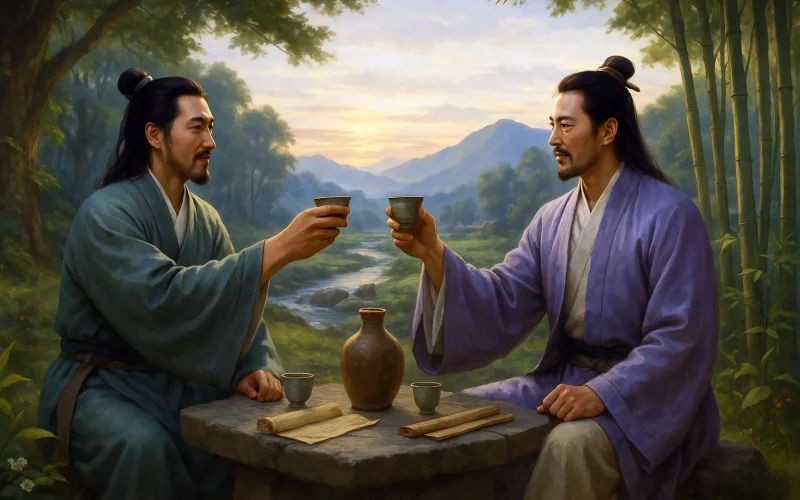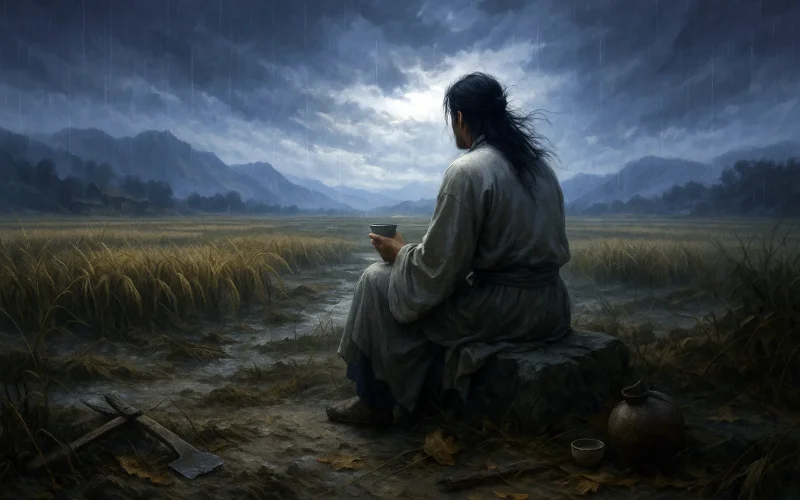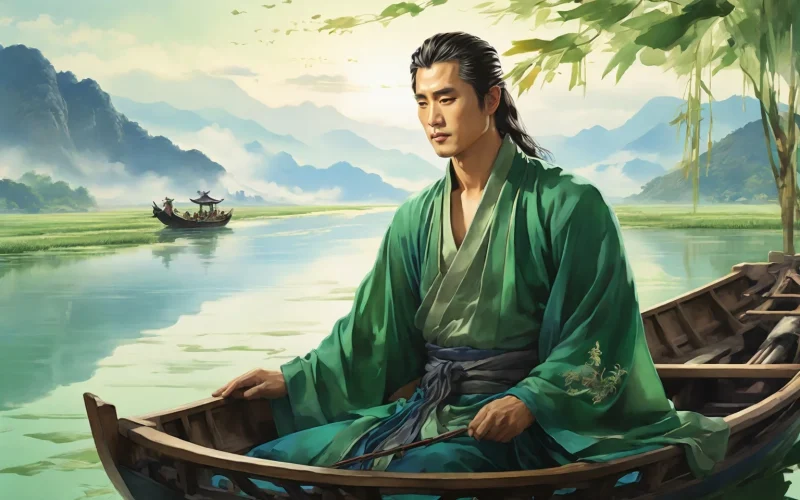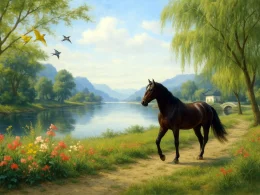Friends may not be acquaintances old,
Chance meeting may warm winter cold.
If we enjoy the same delight,
Your visit beautifies the site.
We talk unlike the vulgar kind,
The sage will elevate our mind.
When we have a jar of good wine,
Home brew would become drink divine.
A lonely hermit fond of rest,
I go no longer east or west.
All men love new things and friends old.
Let news in black and white be told.
Though severed by mountains and streams,
We’re joined in the heart shedding beams.
You love a rural life, but when,
In which year can we meet again?
Original Poem
「答庞参军」
陶渊明
相知何必旧,倾盖定前言。
有客赏我趣,每每顾林园。
谈谐无俗调,所说圣人篇。
或有数斗酒,闲饮自欢然。
我实幽居士,无复东西缘;
物新人惟旧,弱毫多所宣。
情通万里外,形迹滞江山;
君其爱体素,来会在何年!
Interpretation
Composed in 424 AD during Emperor Wen of Song's Yuanjia era, this poem was written by the sixty-year-old Tao Yuanming in response to a farewell verse from Attendant Counselor Pang, who was departing on a mission to Jiangling. Through reminiscences of their friendship, the poet expresses profound camaraderie while reaffirming his contentment with reclusion and disinterest in official pursuits.
First Couplet: "相知何必旧,倾盖定前言。"
"Xiāngzhī hébì jiù, qīng gài dìng qián yán."
True kinship needs no ancient date / When carriage-canopies meet, hearts communicate
The poet emphasizes that genuine friendship transcends duration, finding its essence in spiritual resonance. This concept originates from Records of the Grand Historian, illustrating how kindred spirits recognize each other instantly.
Second Couplet: "有客赏我趣,每每顾林园。"
"Yǒu kè shǎng wǒ qù, měi měi gù línyuán."
Guests who shared my rustic tastes / Often visited my woodland gates
Recalling frequent visits from Pang and others who appreciated his reclusive lifestyle, Tao reveals their mutual intellectual affinity.
Third Couplet: "谈谐无俗调,所说圣人篇。"
"Tán xié wú sú diào, suǒ shuō shèngrén piān."
Our conversations, free of vulgar tone / Turned always to the sages' lore
The poet depicts their elevated discourse, demonstrating shared values that transcended mundane concerns.
Fourth Couplet: "或有数斗酒,闲饮自欢然。"
"Huò yǒu shù dǒu jiǔ, xián yǐn zì huān rán."
Sometimes with jars of wine in store / We drank at leisure, pleased yet poor
Tao highlights their convivial wine-drinking, embodying the unpretentious joy of their rural companionship.
Fifth Couplet: "我实幽居士,无复东西缘;物新人惟旧,弱毫多所宣。"
"Wǒ shí yōu jūshì, wúfù dōngxī yuán; wù xīn rén wéi jiù, ruò háo duō suǒ xuān."
A true hermit I'll remain / No more to chase official gain / Though things renew, old ties sustain / My frail brush pours what words contain
The poet declares his final retirement from politics while valuing enduring friendships, choosing the written word to preserve their bond.
Sixth Couplet: "情通万里外,形迹滞江山;君其爱体素,来会在何年!"
"Qíng tōng wànlǐ wài, xíngjī zhì jiāngshān; jūn qí ài tǐsù, lái huì zài hé nián!"
Though hearts connect across the land / Our bodies stall where mountains stand / Cherish your health, my worthy friend / When shall our paths converge again?
Tao affirms their friendship's transcendence over physical separation while expressing tender concern and wistful hope for reunion.
Holistic Appreciation
This work blends farewell sentiments with celebration of profound friendship. Beginning with shared memories, it progresses to parting sorrow before concluding with hopeful melancholy about future meetings. The poem's sincere emotion and unadorned language reveal Tao's philosophical detachment from official life and deep appreciation for authentic human connection.
Artistic Merits
- Authentic Emotional Expression: Avoiding sentimentalism, Tao conveys depth through understated language.
- Conversational Tone: The verses flow with dialogue-like naturalness, enhancing intimacy.
- Strategic Allusion: The opening historical reference universalizes their instant rapport.
- Structural Elegance: Seamless transition from nostalgic recollection to poignant farewell creates emotional crescendo.
Insights
The poem illuminates friendship's power to bridge temporal and spatial divides. Tao's recluse lifestyle emerges not as escapism but as conscious cultivation of spiritual values. In our hyperconnected yet often superficial age, this work reminds us that meaningful bonds depend on shared essence rather than proximity or frequency of contact. The poet's brush - "frail" yet enduring - symbolizes how art preserves humanity's highest connections across millennia.
Poem translator
Xu Yuan-chong (许渊冲)
About the poet

Tao Yuanming(陶渊明), 365–427 CE, was a poet, literary figure, fu writer, and essayist active during the late Eastern Jin and early Liu Song dynasties. Born in Chaisang (near present-day Jiujiang, Jiangxi Province), he pioneered a new genre of pastoral-themed literature, expressing profound philosophical insights through simple language. His poetic style became an enduring aesthetic standard in classical Chinese poetry.










